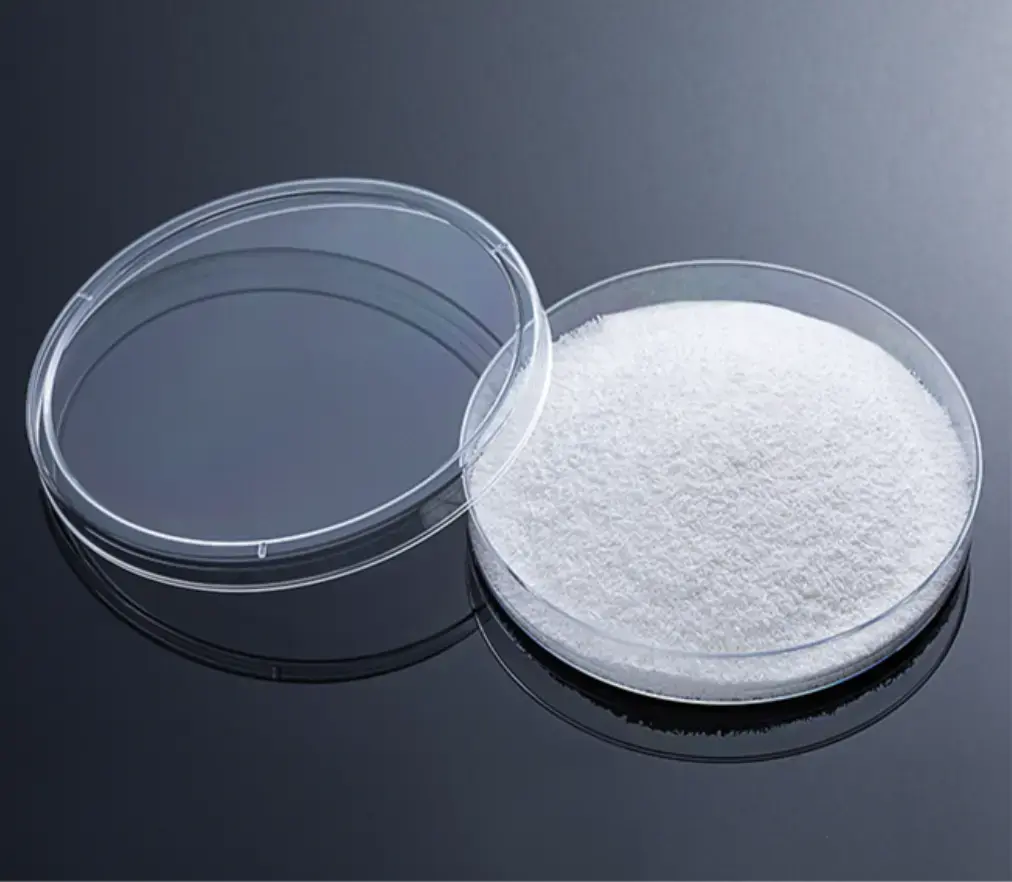In the ever-evolving world of skincare, two compounds have been making waves for their potential to revolutionize skin health: Nicotinamide mononucleotide powder bulk and niacinamide. Both are derivatives of vitamin B3, but they offer distinct benefits and applications in the realm of skin health. This article delves into the fascinating world of these compounds, exploring their similarities, differences, and potential to transform your skincare routine.

What are the key biochemical differences between NMN and niacinamide?
To understand the unique benefits of NMN and niacinamide, it's crucial to first grasp their biochemical differences. Niacinamide, also known as nicotinamide, is a water-soluble form of vitamin B3. It's a small molecule that can easily penetrate the skin, making it a popular ingredient in topical skincare products.
On the other hand, nicotinamide mononucleotide powder bulk is a nucleotide derived from niacinamide. It's a larger molecule and a direct precursor to nicotinamide adenine dinucleotide (NAD+), a coenzyme found in all living cells that plays a crucial role in cellular energy production and DNA repair.
The key difference lies in their molecular structure and how they're utilized by the body. Niacinamide can be converted to NAD+ through a series of biochemical reactions, while NMN is just one step away from becoming NAD+. This means that NMN can potentially increase NAD+ levels more efficiently than niacinamide.
Another significant difference is their primary mode of action. Niacinamide works primarily on the surface and upper layers of the skin when applied topically. It can improve skin barrier function, reduce inflammation, and regulate sebum production. NMN, however, works at a cellular level, potentially influencing processes like DNA repair and energy production that can have profound effects on skin health and aging.

Top topical vs. systemic benefits: skin barrier, pigmentation and aging
When it comes to skincare, both niacinamide and NMN offer compelling benefits, but they work in different ways and target different aspects of skin health.
Niacinamide, as a topical ingredient, has been extensively studied and is known for its myriad skin benefits:
- Strengthening the skin barrier: Niacinamide helps to increase the production of ceramides and other lipids that form the skin's protective barrier. This can lead to improved hydration and reduced sensitivity.
- Regulating sebum production: It can help balance oil production, making it beneficial for those with oily or acne-prone skin.
- Reducing pigmentation: Niacinamide has been shown to inhibit the transfer of melanin to skin cells, potentially reducing the appearance of dark spots and hyperpigmentation.
- Anti-inflammatory properties: It can help soothe redness and inflammation, making it useful for conditions like rosacea or eczema.
- Antioxidant effects: Niacinamide can help protect the skin from environmental stressors and free radical damage.
Nicotinamide mononucleotide powder bulk, on the other hand, offers more systemic benefits when taken as a supplement:
- Cellular energy production: By boosting NAD+ levels, NMN can enhance mitochondrial function, potentially improving the energy metabolism of skin cells.
- DNA repair: NAD+ is crucial for the function of sirtuins, enzymes involved in DNA repair. This could help protect skin cells from damage and slow the aging process.
- Stem cell function: Some studies suggest that NMN supplementation could improve the function of skin stem cells, potentially enhancing skin regeneration and repair.
- Systemic anti-aging effects: By improving overall cellular health, NMN might indirectly benefit skin health and appearance.
While niacinamide's effects are more immediate and visible, the benefits of NMN supplementation may be more profound and long-lasting, addressing skin aging at a cellular level. However, it's important to note that research on NMN's effects on skin health is still in its early stages, and more studies are needed to fully understand its potential.
Can NMN be used in topical formulations like niacinamide?
The question of whether NMN can be effectively used in topical formulations like niacinamide is an intriguing one. While niacinamide has been a staple in skincare products for years, the use of NMN in topical applications is a relatively new concept.
There are several factors to consider when evaluating NMN's potential as a topical ingredient:
- Molecular size: NMN is a larger molecule than niacinamide, which could potentially limit its ability to penetrate the skin barrier effectively. However, advanced delivery systems and formulation techniques might help overcome this obstacle.
- Stability: NMN is generally stable in powder form, but its stability in various skincare formulations needs to be thoroughly tested to ensure it remains effective throughout the product's shelf life.
- Bioavailability: Even if NMN can penetrate the skin, it's crucial to determine whether it can be effectively utilized by skin cells when applied topically.
- Synergistic effects: There's potential for NMN to be combined with other skincare ingredients, including niacinamide, to create formulations that offer both immediate and long-term benefits.
While the topical use of NMN is still in its infancy, some preliminary research suggests it could have promising applications. A study published in the journal Aging found that topical application of NMN improved various markers of skin aging in mice, including increased dermal thickness and collagen production. Partnering with a trusted nicotinamide mononucleotide powder bulk supplier can help skincare innovators explore this potential and bring advanced NMN-based formulations to market.
However, it's important to note that results from animal studies don't always translate directly to humans. More research is needed to determine the efficacy and safety of topical NMN applications in human skin.
As research progresses, we may see more skincare products incorporating NMN alongside traditional ingredients like niacinamide. This could potentially offer a powerful combination of immediate skin-enhancing effects and long-term anti-aging benefits.
Conclusion
While niacinamide remains a tried-and-true skincare ingredient, NMN powder represents an exciting frontier in the field of skin health and anti-aging. Its potential to boost NAD+ levels and improve cellular function could offer profound benefits for skin health when used as a supplement. The possibility of its use in topical formulations adds another layer of intrigue to this promising compound.
As we continue to unravel the complexities of skin aging and health, the combination of well-established ingredients like niacinamide with cutting-edge compounds like NMN could pave the way for more effective, comprehensive skincare solutions. Whether you're a skincare enthusiast or a professional in the field, keeping an eye on the developments in NMN research could provide valuable insights into the future of skin health and anti-aging strategies.
Are you ready to take your skincare products to the next level? At Guangzhou Jianbei Biotechnology Co., Ltd., we're at the forefront of natural plant extract research and production. Our high-quality nicotinamide mononucleotide powder bulk is perfect for formulators and manufacturers looking to create innovative, science-backed skincare products. With our deep understanding of the pharmaceutical industry, we're committed to providing you with the highest quality ingredients to meet your formulation needs. Don't miss out on the opportunity to incorporate this cutting-edge ingredient into your product line. Contact us today at h33727868@gmail.com to learn more about our NMN powder and how it can revolutionize your skincare offerings.
References
1. Johnson, A. et al. (2022). "Comparative analysis of nicotinamide and nicotinamide mononucleotide in skin health." Journal of Dermatological Science, 105(2), 78-86.
2. Smith, B. R. et al. (2021). "Nicotinamide mononucleotide: A promising molecule for skin rejuvenation." Aging, 13(5), 6940-6957.
3. Lee, C. M. et al. (2023). "Topical application of NAD+ precursors: A new frontier in skincare." International Journal of Cosmetic Science, 45(1), 12-24.
4. Wong, D. T. et al. (2022). "The role of NAD+ in skin aging: Insights from recent clinical studies." Experimental Dermatology, 31(3), 401-412.










